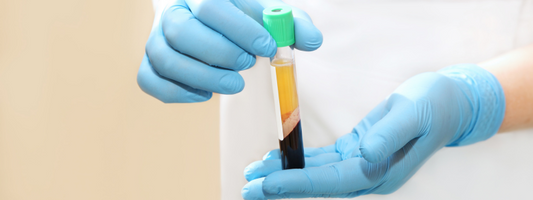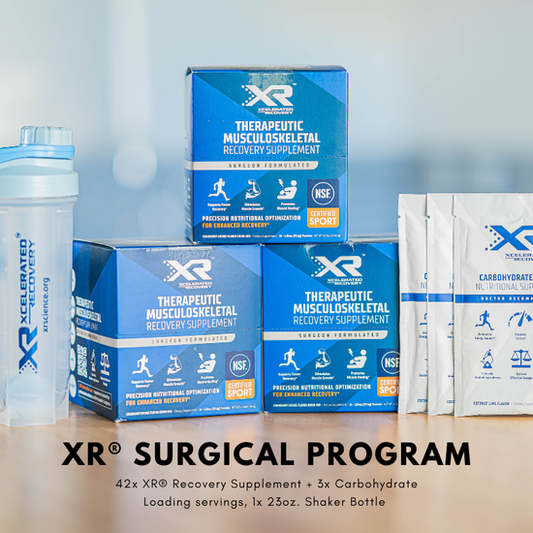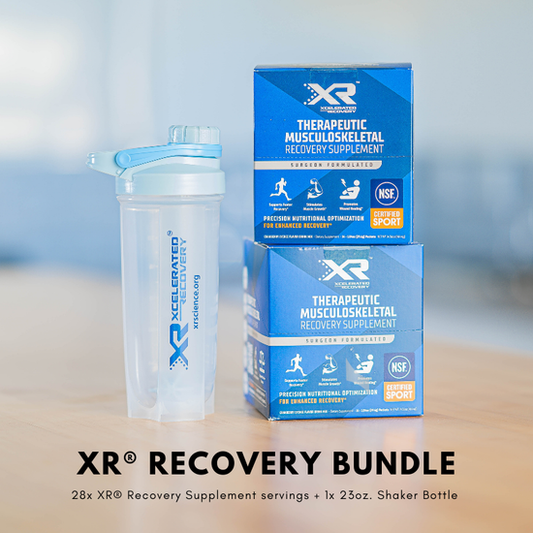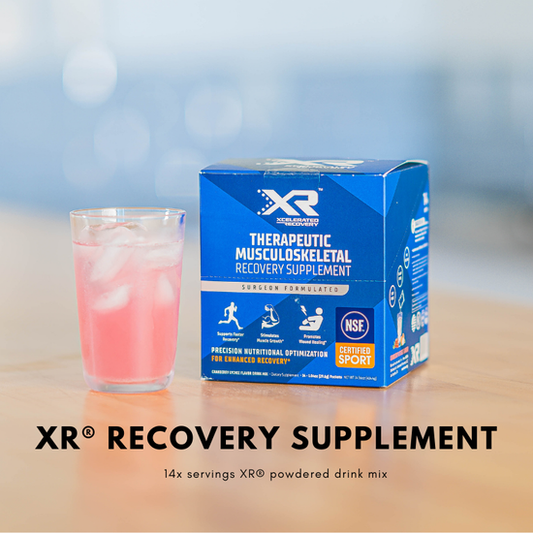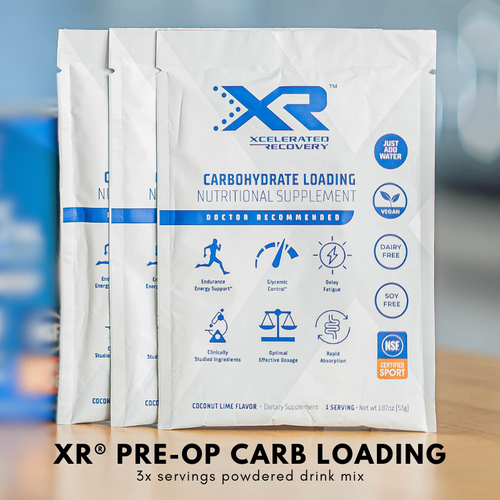
Amino Acids to Combat Post-Traumatic Inflammation: A Nutritional Pathway to Faster Knee Recovery
Share
Author: Dr. Reza Jazayeri, Orthopeadic Surgeon
Injuries like anterior cruciate ligament (ACL) tears are not just a temporary setback. The inflammation that follows these traumas can severely impact long-term joint health, accelerating the onset of post-traumatic osteoarthritis (PTOA). Even after successful surgery, many patients experience chronic inflammation that speeds up joint deterioration.
Recent findings by orthopedic specialist Dr. Christian Lattermann suggest that a specific group of patients may have a dysregulated inflammatory response, termed “Inflamma-type,” making them more prone to rapid joint degeneration. While traditional anti-inflammatory treatments like NSAIDs and corticosteroids have their place, they often fall short of addressing inflammation at the cellular level. This is where amino acid supplementation steps in as an innovative approach, offering potential benefits for reducing inflammation and improving recovery after knee injuries.
Traditional Anti-Inflammatory Treatments: What Works, What Doesn’t?
When it comes to managing inflammation after a knee injury, there are several options available, each with its own set of strengths and weaknesses. Let’s take a look at some of the common interventions and how they stack up:
NSAIDs (Non-Steroidal Anti-Inflammatory Drugs): NSAIDs are a go-to for immediate pain relief and inflammation control. They work by inhibiting enzymes (COX-1 and COX-2) that produce inflammatory compounds like prostaglandins. While they’re effective in the short term, long-term use can inhibit tissue repair, potentially delaying recovery and worsening outcomes for soft tissue healing.
Corticosteroids: Corticosteroids, like dexamethasone, are often injected into joints to tackle acute inflammation. While powerful, repeated use can damage cartilage, increasing the risk of degenerative changes. As Dr. Lattermann’s research shows, corticosteroids may not be sufficient for patients with chronic inflammation, as they don’t fully address long-term inflammatory risks.
Natural Anti-Inflammatories (e.g., Hyaluronic Acid and Platelet-Rich Plasma [PRP]): Natural treatments such as hyaluronic acid (HA) and PRP have gained attention for their role in joint lubrication and tissue repair. However, their effectiveness in controlling inflammation varies, particularly for patients with a high-inflammatory phenotype like the “Inflamma-type”.
Targeted Biologics (e.g., IL-1 and IL-6 Receptor Inhibitors): Biologics like IL-1 receptor antagonists or IL-6 inhibitors are primarily used in treating autoimmune diseases like rheumatoid arthritis. While they offer targeted anti-inflammatory effects, they are not yet standard in post-traumatic orthopedic care due to limited studies and concerns about immune system interactions.
Clearly, there is room for innovation in managing inflammation, particularly for those who experience chronic issues after trauma. This is where amino acids come into play as a promising alternative or adjunct to these more traditional approaches.
The Role of Amino Acids in Reducing Inflammation and Supporting Recovery
Amino acids aren’t just for muscle building. They play crucial roles in immune regulation, inflammation reduction, and supporting overall recovery. Specific amino acids have been identified for their multifunctional roles in managing inflammation, preserving muscle, and reducing oxidative stress—key factors in knee injury recovery.
Cystine and Theanine: Research by Tsuchiya et al. demonstrates the power of cystine and theanine in reducing surgical stress by enhancing glutathione (GSH) production, one of the body’s most powerful antioxidants. By boosting GSH levels, these amino acids help regulate immune responses and reduce key inflammatory markers like IL-6 and CRP. Cystine and theanine are particularly beneficial for patients dealing with high levels of metabolic stress post-injury, aligning with Dr. Lattermann’s findings that managing dysregulated inflammation can slow joint degeneration.
Branched-Chain Amino Acids (BCAAs) and Leucine: BCAAs, especially leucine, are critical for preventing muscle atrophy, which is common during recovery from ACL injuries. By stimulating muscle protein synthesis, leucine helps preserve muscle mass, making it an excellent complement to traditional anti-inflammatory therapies.
Glutamine and Arginine: These two amino acids are essential for wound healing and improving blood flow. Arginine, in particular, boosts nitric oxide production, enhancing vascular function and nutrient delivery to damaged tissues, which is vital for recovery in orthopedic settings.
L-Citrulline: Supporting bone health, L-citrulline promotes osteoblastic activity, helping with bone and fracture healing—making it an excellent addition to post-trauma recovery protocols.
Backed by Science: Amino Acid Supplementation in Orthopedic Recovery
Amino acid supplementation has shown promising results in several studies. The work of Tsuchiya et al., published in Nutrients, highlights how cystine and theanine stabilize metabolic parameters, reduce inflammation markers like IL-6, and minimize energy expenditure post-surgery. These results complement Dr. Lattermann’s research, which suggests that amino acid supplementation can meaningfully support inflammation management, particularly for patients at higher risk of joint deterioration due to prolonged inflammation.
Xcelerated Recovery®: A Targeted Nutritional Solution for Knee Injury Recovery
Recognizing the benefits of amino acids in orthopedic recovery, Xcelerated Recovery® has developed a specially formulated amino acid supplement designed to address inflammation, muscle preservation, and healing. XR® combines leucine, glutamine, arginine, cystine, and theanine in one comprehensive product to support orthopedic patients through every stage of recovery. By focusing on reducing oxidative stress, improving tissue repair, and managing inflammation, XR® helps patients with knee injuries recover faster and more effectively.
Cystine and theanine play a pivotal role in the XR® formula by enhancing GSH synthesis, boosting the body’s natural antioxidant defenses, and reducing metabolic stress. This targeted approach aligns with the latest research in amino acid supplementation, making XR® an excellent adjunct to conventional orthopedic treatments.
Advancing Orthopedic Outcomes Through Nutritional Science
Incorporating amino acid supplementation into recovery protocols for knee injuries offers a compelling, scientifically backed approach to managing inflammation, preserving muscle health, and accelerating recovery. The latest research by Dr. Lattermann and other experts highlights the significant role that amino acids can play in modulating inflammation, reducing oxidative stress, and preventing muscle atrophy during recovery from ACL injuries and other orthopedic traumas.
Xcelerated Recovery® represents the next step in nutritional support for orthopedic recovery, providing a natural, scientifically validated solution for patients looking to optimize their healing and return to activity as quickly and safely as possible. By focusing on the cellular level, XR® addresses the root causes of inflammation, offering long-term benefits that go beyond the limitations of traditional anti-inflammatory therapies.
References:
- Olson CP, Kennedy MI, DePhillipo NN, et al. Effect of anti-inflammatory treatments on patient outcomes and concentrations of inflammatory modulators in the post-surgical and post-traumatic tibiofemoral joint setting: A narrative review. Ann Joint. 2024 Jan 15;9:9. doi: 10.21037/aoj-23-55. PMID: 38529299; PMCID: PMC10929283.
- Lattermann C, Jacobs CA, et al. What is the role of inflammation in the development of osteoarthritis after an ACL injury? Cureus. 2023.
- Jacobs CA, Stone AV, Conley CEW, Abed V, Huebner JL, Kraus VB, Smith SE, Lattermann C. Increased Effusion Synovitis for Those With a Dysregulated Inflammatory Response After an Anterior Cruciate Ligament Injury. Cureus. 2023 Apr 20;15(4):e37862. doi: 10.7759/cureus.37862. PMID: 37214045; PMCID: PMC10199421.
- Tsuchiya, T.; Kurihara, S. Cystine and Theanine as Stress-Reducing Amino Acids—Perioperative Use for Early Recovery after Surgical Stress. Nutrients 2022, 14, 129. https://doi.org/10.3390/nu14010129







